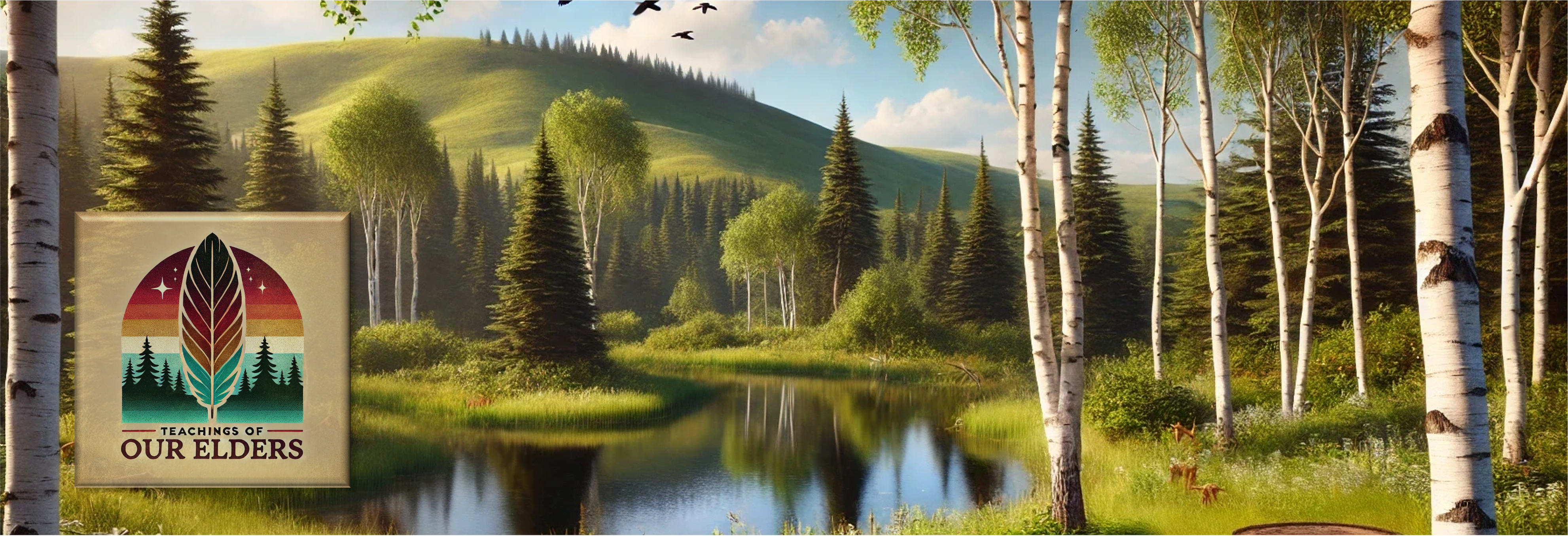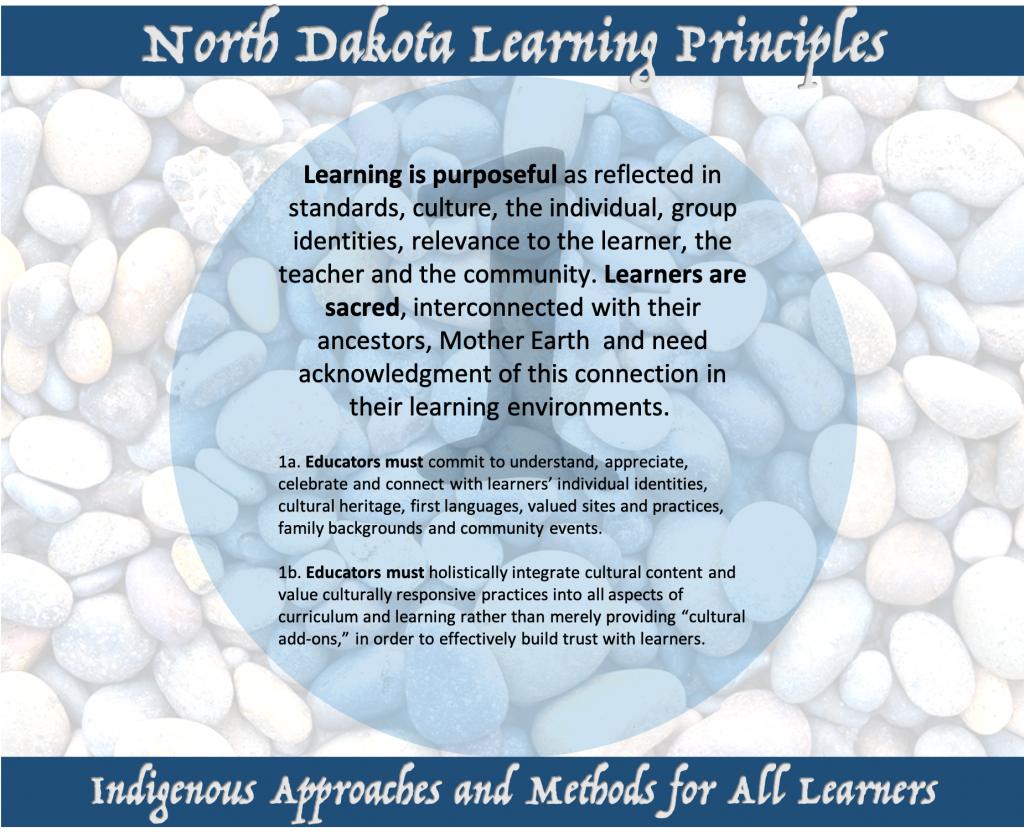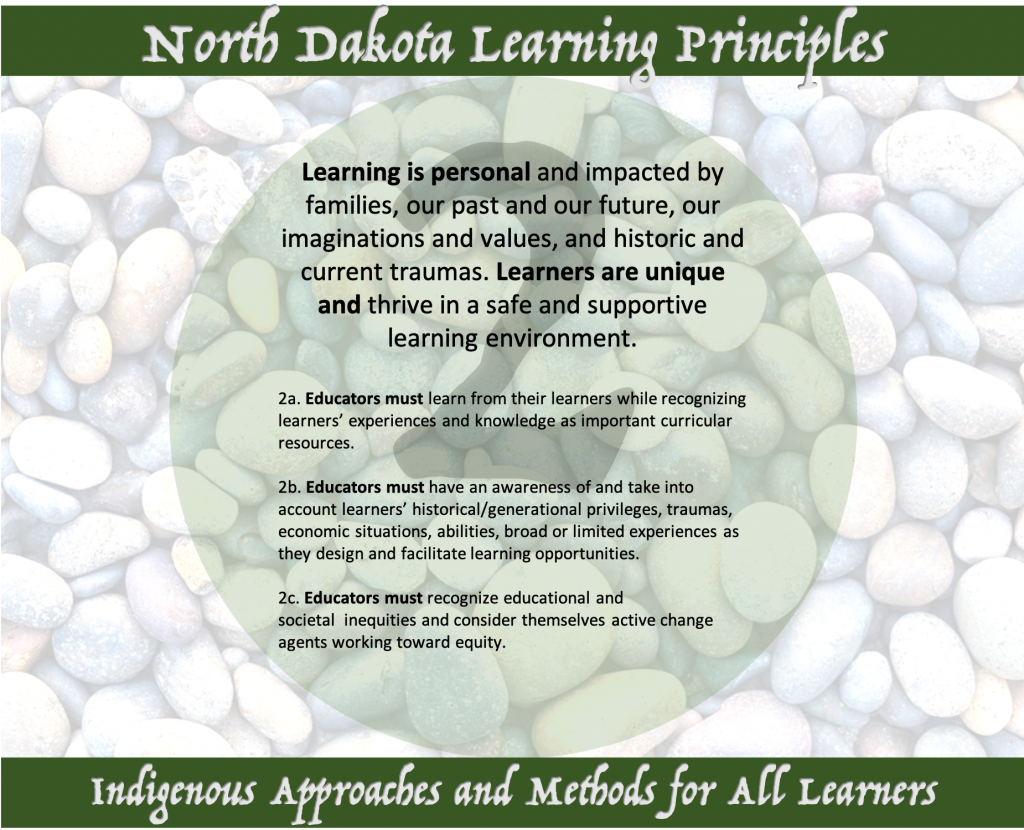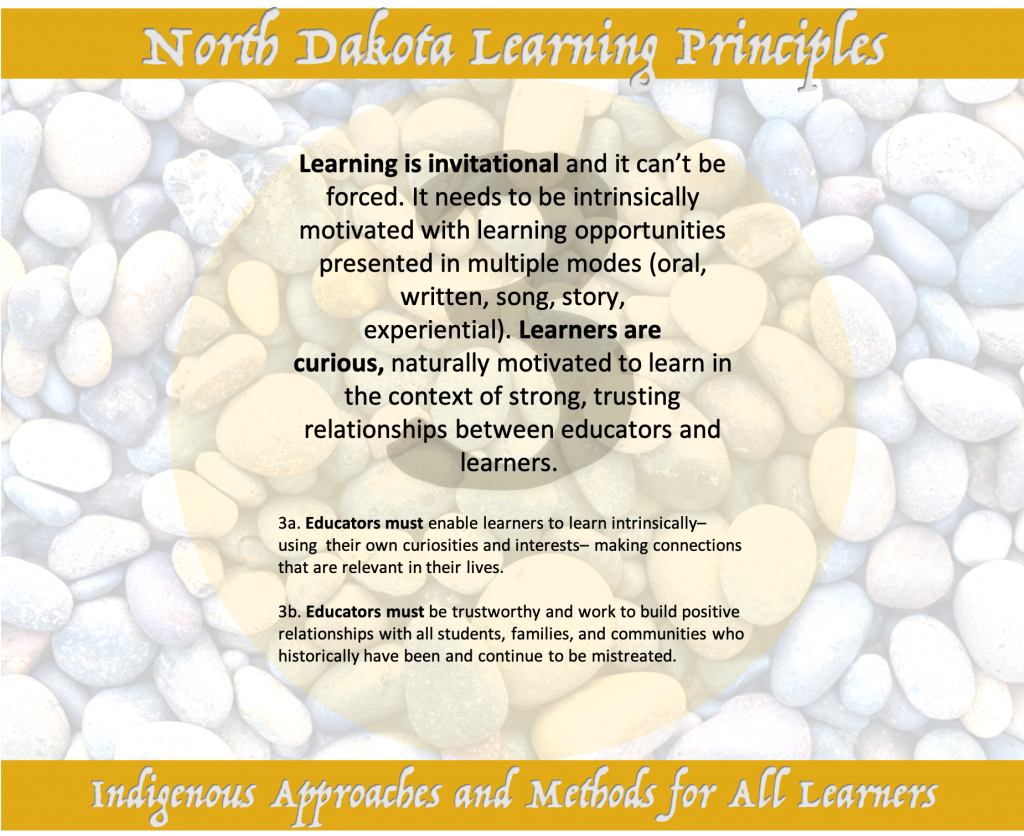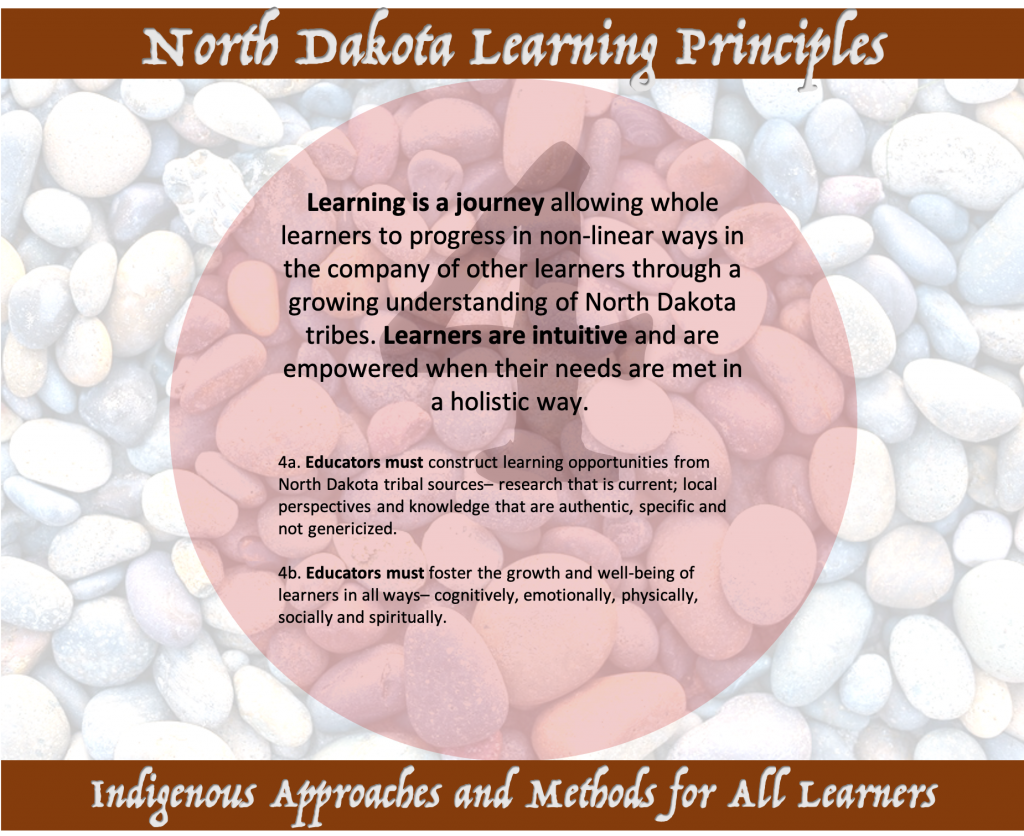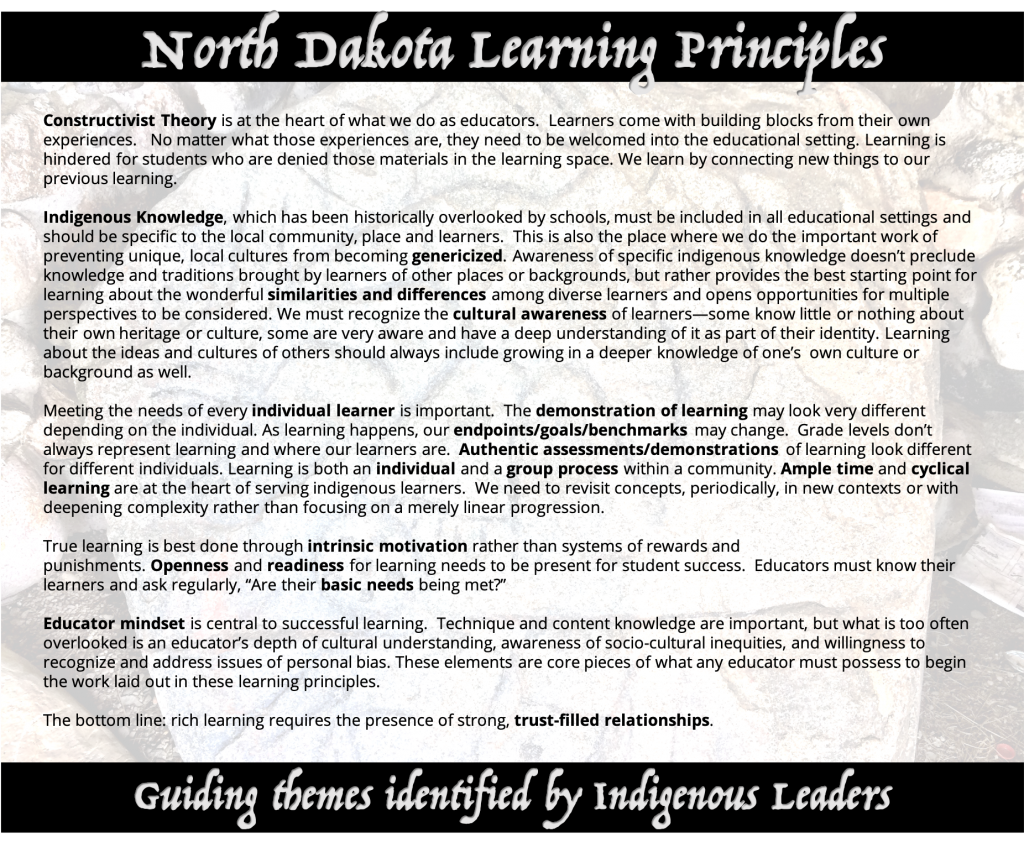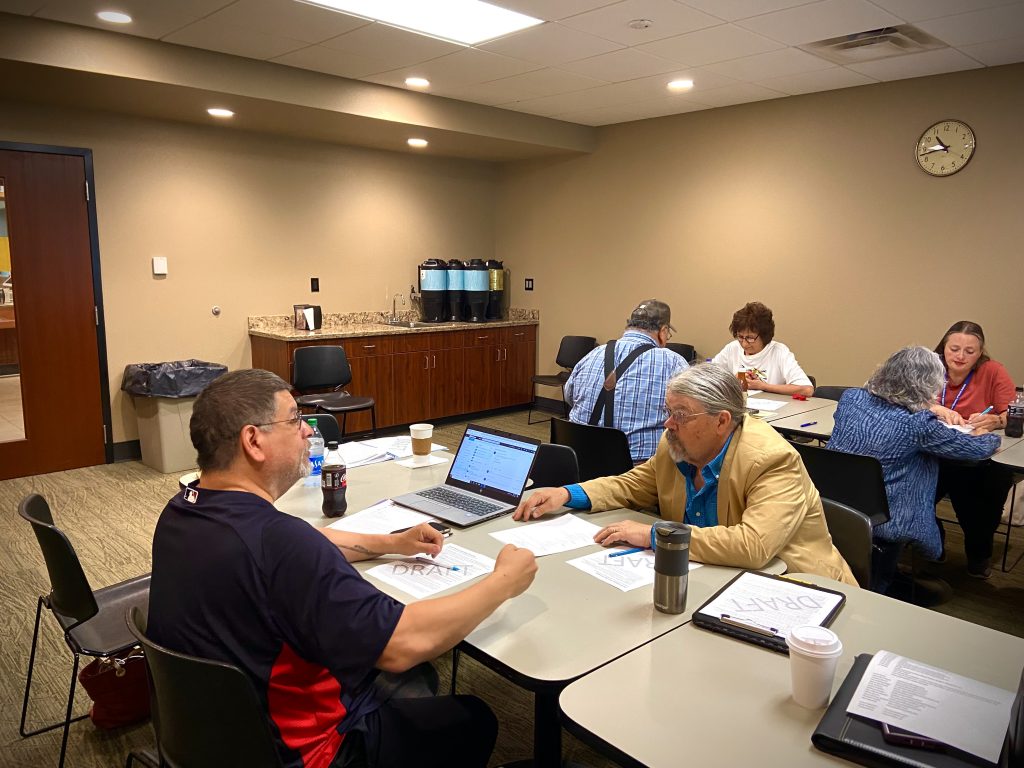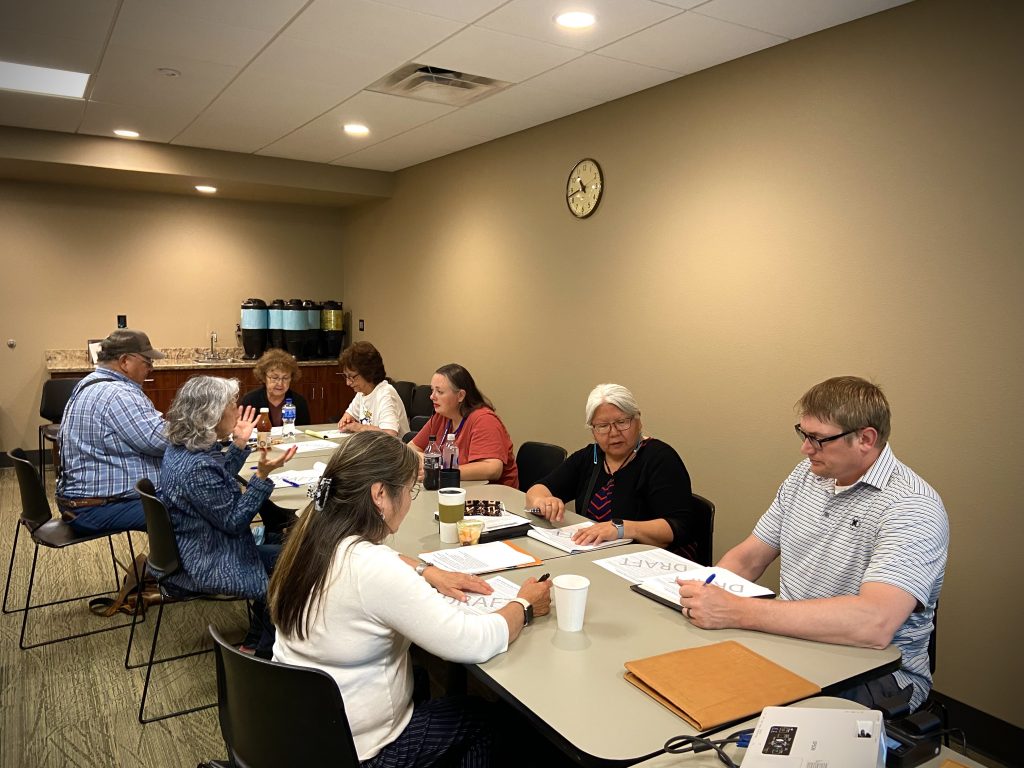Indigenous Approaches and Methods for All Learners
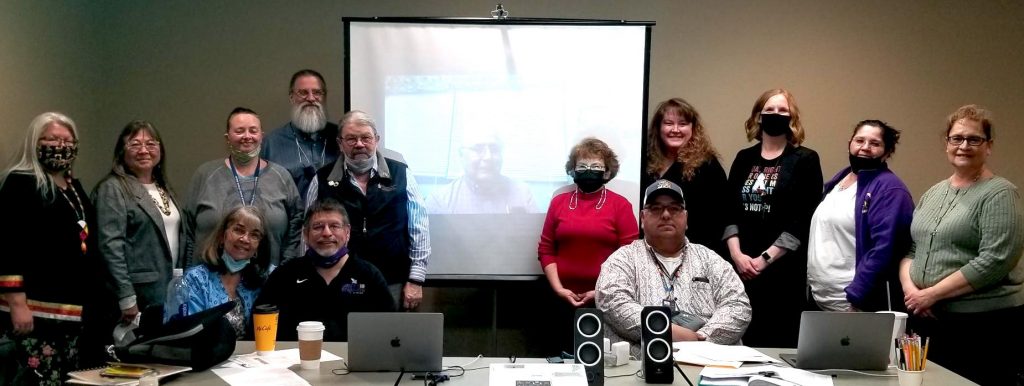
North Dakota Learning Principles
Indigenous Approaches and Methods for All Learners
1. Learning is purposeful as reflected in standards, culture, the individual, group identities, relevance to the learner, the teacher and the community. Learners are sacred, interconnected with their ancestors, Mother Earth and need acknowledgment of this connection in their learning environments.
THEREFORE…
1a. Educators must commit to understand, appreciate, celebrate and connect with learners’ individual identities, cultural heritage, first languages, valued sites and practices, family backgrounds and community events.
1b. Educators must holistically integrate cultural content and value culturally responsive practices into all aspects of curriculum and learning rather than merely providing “cultural add-ons,” in order to effectively build trust with learners.
2. Learning is personal and impacted by families, our past and our future, our imaginations and values, and historic and current traumas. Learners are unique, and thrive in a safe and supportive learning environment.
THEREFORE…
2a. Educators must learn from their learners while recognizing learners’ experiences and knowledge as important curricular resources.
2b. Educators must have an awareness of and take into account learners’ historical/generational privileges, traumas, economic situations, abilities, broad or limited experiences as they design and facilitate learning opportunities.
2c. Educators must recognize educational and societal inequities and consider themselves active change agents working toward equity.
3. Learning is invitational and it can’t be forced. It needs to be intrinsically motivated with learning opportunities presented in multiple modes (oral, written, song, story, experiential). Learners are curious, naturally motivated to learn in the context of strong, trusting relationships between educators and learners.
THEREFORE…
3a. Educators must enable learners to learn intrinsically–using their own curiosities and interests– making connections that are relevant in their lives.
3b. Educators must be trustworthy and work to build positive relationships with all students, families, and communities who historically have been and continue to be mistreated.
4. Learning is a journey allowing whole learners to progress in non-linear ways in the company of other learners through a growing understanding of North Dakota tribes. Learners are intuitive and are empowered when their needs are met in a holistic way.
THEREFORE…
4a. Educators must construct learning opportunities from North Dakota tribal sources– research that is current; local perspectives and knowledge that are authentic, specific and not genericized.
4b. Educators must foster the growth and well-being of learners in all ways– cognitively, emotionally, physically, socially and spiritually.
Guiding Themes Identified by Indigenous Leaders on the North Dakota Learning Principles Team
Constructivist Theory is at the heart of what we do as educators. Learners come with building blocks from their own experiences. No matter what those experiences are, they need to be welcomed into the educational setting. Learning is hindered for students who are denied those materials in the learning space. We learn by connecting new things to our previous learning.
Indigenous Knowledge, which has been historically overlooked by schools, must be included in all educational settings and should be specific to the local community, place and learners. This is also the place where we do the important work of preventing unique, local cultures from becoming genericized. Awareness of specific indigenous knowledge doesn’t preclude knowledge and traditions brought by learners of other places or backgrounds, but rather provides the best starting point for learning about the wonderful similarities and differences among diverse learners and opens opportunities for multiple perspectives to be considered. We must recognize the cultural awareness of learners—some know little or nothing about their own heritage or culture, some are very aware and have a deep understanding of it as part of their identity. Learning about the ideas and cultures of others should always include growing in a deeper knowledge of one’s own culture or background as well.
Meeting the needs of every individual learner is important. The demonstration of learning may look very different depending on the individual. As learning happens, our endpoints/goals/benchmarks may change. Grade levels don’t always represent learning and where our learners are. Authentic assessments/demonstrations of learning look different for different individuals. Learning is both an individual and a group process within a community. Ample time and cyclical learning are at the heart of serving indigenous learners. We need to revisit concepts, periodically, in new contexts or with deepening complexity rather than focusing on a merely linear progression.
True learning is best done through intrinsic motivation rather than systems of rewards and punishments. Openness and readiness for learning needs to be present for student success. Educators must know their learners and ask regularly, “Are their basic needs being met?”
Educator mindset is central to successful learning. Technique and content knowledge are important, but what is too often overlooked is an educator’s depth of cultural understanding, awareness of socio-cultural inequities, and willingness to recognize and address issues of personal bias. These elements are core pieces of what any educator must possess to begin the work laid out in these learning principles.
The bottom line: rich learning requires the presence of strong, trust-filled relationships.
The North Dakota Learning Principles Development Team:
Carol Davis (Turtle Mountain Band of Chippewa)
Marc Blue Stone (Mandan, Hidatsa & Arikara)
Charles Moran (Mandan, Hidatsa & Arikara)
Pat Walking Eagle (Spirit Lake Dakota)
Baron Blanchard (Bismarck Educator)
Erik Holland (Curator of Education, State Historical Society of North Dakota)
Kathy Froelich (Mandan, Hidatsa & Arikara)
Melissa Cournia (Bismarck Educator)
Flo Laducer-Garrett (Mandan, Hidatsa & Arikara)
Oliver Gourd (Spirit Lake Dakota)
Joyce Shining Oneside (Turtle Mountain Band of Chippewa)
Danielle Stuckle (Education Outreach Coordinator, State Historical Society of ND)
Amy Mossett (Mandan, Hidatsa & Arikara)
Lucy Fredericks (Standing Rock Lakota)
Scott Simpson (Learning Specialist)
Sharla Steever (Learning Specialist)
